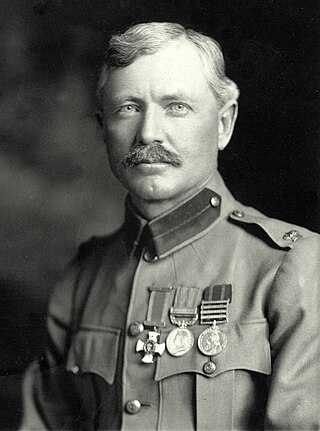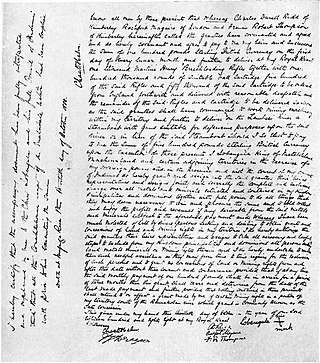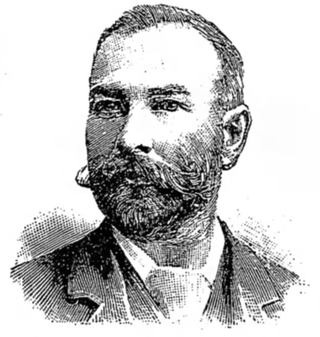
Southern Rhodesia was a landlocked, self-governing British Crown colony in Southern Africa, established in 1923 and consisting of British South Africa Company (BSAC) territories lying south of the Zambezi River. The region was informally known as South Zambesia until annexation by Britain, at the behest of Cecil Rhodes's British South Africa Company. The bounding territories were Bechuanaland (Botswana), Northern Rhodesia (Zambia), Portuguese Mozambique (Mozambique) and the Transvaal Republic.

Lobengula Khumalo was the second and last official king of the Northern Ndebele people. Both names in the Ndebele language mean "the men of the long shields", a reference to the Ndebele warriors' use of the Nguni shield.

Matabeleland is a region located in southwestern Zimbabwe that is divided into three provinces: Matabeleland North, Bulawayo, and Matabeleland South. These provinces are in the west and south-west of Zimbabwe, between the Limpopo and Zambezi rivers and are further separated from Midlands by the Shangani River in central Zimbabwe. The region is named after its inhabitants, the Ndebele people who were called "Amatabele"(people with long shields – Mzilikazi 's group of people who were escaping the Mfecani wars). Other ethnic groups who inhabit parts of Matabeleland include the Tonga, Bakalanga, Venda, Nambya, Khoisan, Xhosa, Sotho, Tswana, and Tsonga.

The Pioneer Column was a force raised by Cecil Rhodes and his British South Africa Company in 1890 and used in his efforts to annex the territory of Mashonaland, later part of Zimbabwe.
The Northern Ndebele people are a Nguni ethnic group native to Southern Africa. Significant populations of native speakers of the Northern Ndebele language (siNdebele) are found in Zimbabwe and as amaZulu in South Africa. They differ from Southern Ndebele people who speak isiNdebele of KwaNdebele.

Major Frederick Russell Burnham DSO was an American scout and world-traveling adventurer. He is known for his service to the British South Africa Company and to the British Army in colonial Africa, and for teaching woodcraft to Robert Baden-Powell in Rhodesia. Burnham helped inspire the founding of the international Scouting Movement.

The First Matabele War was fought between 1893 and 1894 in modern-day Zimbabwe. It pitted the British South Africa Company against the Ndebele (Matabele) Kingdom. Lobengula, king of the Ndebele, had tried to avoid outright war with the company's pioneers because he and his advisors were mindful of the destructive power of European-produced weapons on traditional Matabele impis attacking in massed ranks. Lobengula reportedly could muster 80,000 spearmen and 20,000 riflemen, armed with Martini-Henry rifles, which were modern arms at that time. However, poor training may have resulted in the weapons not being used effectively.

The Second Matabele War, also known as the First Chimurenga, was fought in 1896 and '97 in the region later known as Southern Rhodesia, now modern-day Zimbabwe. It pitted the British South Africa Company against the Matabele people, which led to conflict with the Shona people in the rest of Southern Rhodesia.

The Rudd Concession, a written concession for exclusive mining rights in Matabeleland, Mashonaland and other adjoining territories in what is today Zimbabwe, was granted by King Lobengula of Matabeleland to Charles Rudd, James Rochfort Maguire and Francis Thompson, three agents acting on behalf of the South African-based politician and businessman Cecil Rhodes, on 30 October 1888. Despite Lobengula's retrospective attempts to disavow it, it proved the foundation for the royal charter granted by the United Kingdom to Rhodes's British South Africa Company in October 1889, and thereafter for the Pioneer Column's occupation of Mashonaland in 1890, which marked the beginning of white settlement, administration and development in the country that eventually became Rhodesia, named after Rhodes, in 1895.

The military history of Zimbabwe chronicles a vast time period and complex events from the dawn of history until the present time. It covers invasions of native peoples of Africa, encroachment by Europeans, and civil conflict.

Allan Wilson was an officer in the Victoria Volunteers. He is best known for his leadership of the Shangani Patrol in the First Matabele War. His death fighting overwhelming odds made him a national hero in Britain and Rhodesia.
Major Patrick William Forbes was a British South Africa Police officer who commanded a British South Africa Company force which invaded Matabeland during the First Matabele War.
Europeans first came to the region in southern Africa today called Zimbabwe in the sixteenth century, when Portuguese colonials ventured inland from Mozambique and attacked the Kingdom of Mutapa, which then controlled an area roughly equivalent to eastern Zimbabwe and western Mozambique. Portuguese influence over Mutapa endured for about two centuries before fading away during the 1690s and early-1700s (decade). During the year of 1685, French Huguenots emigrated to present-day South Africa and whilst some settled there, others moved further north into the continent. Those who did, settled within modern-day Zimbabwe, Mozambique and Botswana, and co-existed with the indigenous people; most of whom, in Zimbabwe, were the Naletale people.

The Shangani Patrol was a 34-soldier unit of the British South Africa Company that in 1893 was ambushed and annihilated by more than 3,000 Matabele warriors in pre-Southern Rhodesia, during the First Matabele War. Headed by Major Allan Wilson, the patrol was attacked just north of the Shangani River in Matabeleland, Rhodesia. Its dramatic last stand, sometimes called "Wilson's Last Stand", achieved a prominent place in the British public imagination and, subsequently, in Rhodesian history, similarly to events such as the Battle of the Little Bighorn and the Battle of the Alamo in the United States.

Mthwakazi is the traditional name of the proto-Ndebele people and Ndebele kingdom and is located in between Sanyati river and Limpopo River in the area of today's Zimbabwe. Mthwakazi is widely used to refer to inhabitants of Matebeleland Province in Zimbabwe.

Major Wilson's Last Stand is an 1899 British short silent war film based upon the historical accounts of the Shangani Patrol. The film was adapted from Savage South Africa, a stage show depicting scenes from both the First Matabele War and the Second Matabele War which opened at the Empress Theatre, Earls Court, on 8 May 1899. It was shot by Joseph Rosenthal for Warwick Trading Co. Ltd.

The British South Africa Company's administration of what became Rhodesia was chartered in 1889 by Queen Victoria of the United Kingdom, and began with the Pioneer Column's march north-east to Mashonaland in 1890. Empowered by its charter to acquire, govern and develop the area north of the Transvaal in southern Africa, the Company, headed by Cecil Rhodes, raised its own armed forces and carved out a huge bloc of territory through treaties, concessions and occasional military action, most prominently overcoming the Matabele army in the First and Second Matabele Wars of the 1890s. By the turn of the century, Rhodes's Company held a vast, land-locked country, bisected by the Zambezi river. It officially named this land Rhodesia in 1895, and ran it until the early 1920s.

The Battle of the Shangani took place on 25 October 1893 during the First Matabele War in what is now Zimbabwe. A British South Africa Company column led by Major Patrick William Forbes was attacked during night by a large force of Ndebele Kingdom warriors. Equipped with superior weaponry, the column, consisting of British South Africa Police troopers and African auxiliaries, repulsed them with a heavy loss of life to the Ndebele force. The battle is noted for being the first battle in which the Maxim gun played an important role.

Johan Wilhelm Colenbrander CB was a Natal-born soldier and colonial official in Southern Africa. Colenbrander served with the Natal Mounted Police and the Stanger Mounted Rifles, seeing action in the 1879 Anglo-Zulu War. During the war Colenbrander negotiated the surrender of Zulu Inkosi (chief) Zibhebhu kaMaphitha and afterwards worked for him as a secretary and gunrunner. He fought for Zibhebhu during the 1883–1884 Third Zulu Civil War but lost all his trade goods and cattle when Zibhebhu was defeated.















